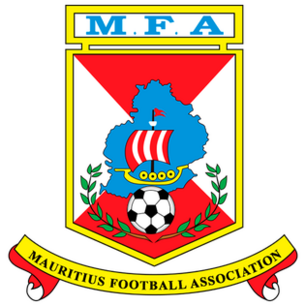Related Research Articles

The Cape Verde women's national football team represents Cape Verde in international women's association football and is governed by the Cape Verdean Football Federation.

The Djibouti women's national football team represents the country in international competitions. Football is organised by the Djiboutian Football Federation, with women's football formally organised in the country in 2002, and a national team was later created.
The Ivory Coast women's national football team represents Ivory Coast in international women's football and is controlled by the Ivorian Football Federation. They played their first international match in 1988. The team is currently ranked 64th in the FIFA Women's World Rankings and as the 6th best team in CAF.
The Kenya women's national football team represents Kenya in women's football and is controlled by the Football Kenya Federation.
The Lesotho women's national football team is the national team of Lesotho and is controlled by the Lesotho Football Association.

The Liberia women's national football team represents Liberia in international women's football. It is governed by the Liberia Football Association. It has played in five FIFA recognised matches.
The Libya women's national football team is the national football team of Libya. It does not have FIFA recognition. It is not ranked by FIFA. There are development plans in the country to improve the state of women's football.
The Mauritania women's national football team has not played a single FIFA recognised match. Women's football is not supported by the Football Federation of the Islamic Republic of Mauritania and there are few opportunities for women to play the sport.
The Madagascar women's national football team is the FIFA recognised senior women's A team for Madagascar. The team played their first FIFA matches in 2015. They were runner-up to Réunion in the 2015 Indian Ocean Island Games. They have competed in the COSAFA Women's Championship, in which they won a game against Comoros in 2019. The development of a national team in the country is problematic because of issues found on the continent and on the island, specifically the lack of popularity of women's football as a participation sport in Madagascar.

The Mauritius women's national football team is a women's association football team that represents the country of Mauritius. They are controlled by the Mauritius Football Association and are members of FIFA, the Confederation of African Football (CAF), and the Council of Southern Africa Football Associations (COSAFA). The development of women's football in the country and in Africa as a whole faces a number of challenges, with a programme for women's football not being created in the country until 1997. FIFA gives money to the Mauritius Football Association, 10% of which is aimed at developing football in the country in areas that include women's football, sport medicine and futsal.
The Niger women's national football team represents Niger in international women's football. It is governed by the Nigerien Football Federation. It has played in four FIFA recognised matches, two of which were losses to Burkina Faso women's national football team in 2007. There is an under-20 women's national team who were supposed to participate in the 2002 African Women U-19 Championship but withdrew before playing a game. There are problems that impact the development of the women's game in Africa that effect Niger.

The Seychelles women's national football team is the national team of the Seychelles.
The São Tomé and Príncipe women's national football team represents São Tomé and Príncipe in international women's football. It is governed by the São Toméan Football Federation. It has played in six FIFA recognised matches and has never been internationally ranked by FIFA. The country also has a national under-19 team.
Football is the most popular sport for women in Somalia. However, Somalia does not have a women's national football team with FIFA recognition, and have never played in a single international fixture. They are in a region that faces many challenges for the development of women's sport. Football is the most popular women's sport in the country and teams do exist for women to play on though they are few. Participation rates dropped by a large number in 2006. The sport's governing body in the country is not providing much support for the game and faces its own challenges.
The Sierra Leone women's national football team represents Sierra Leone in international women's football. It is governed by the Sierra Leone Football Association, which is part of the Confederation of African Football. Sierra Leone has played only four FIFA recognised matches, two in 1994 and two in 2010. The country has under-17 and under-20 women's national sides. The development of women's football in Sierra Leone faces challenges present throughout the continent. Domestically, it faces its own issues including the lack of a women's domestic competition and the decline in popularity of the sport among women.
The Lesotho women's national under-17 team represents the country in international competitions.
The Lesotho women's national under-20 football team represents the country in international youth women's football competitions.
The Kenya women's national under-20 football team represents Kenya at an under-20 level in women's football and is controlled by the Football Kenya Federation.
The Kenya women's national under-17 football team represents Kenya at an under-17 level in women's football and is controlled by the Football Kenya Federation.
Women's football in Seychelles faces several development problems inside the country including a lack of popularity for the sport, and few female players and teams. Women have gained football leadership positions in the country with one coaching a men's team and another umpiring international matches. There are other development issues for the sport that are ones facing the whole of Africa.
References
- 1 2 Peter Alegi (2 March 2010). African Soccerscapes: How a Continent Changed the World's Game. Ohio University Press. ISBN 978-0-89680-278-0. Archived from the original on 21 December 2016. Retrieved 22 April 2012.
- ↑ Jean Williams (15 December 2007). A Beautiful Game: International Perspectives on Women's Football. Berg. p. 186. ISBN 978-1-84520-674-1. Archived from the original on 8 January 2014. Retrieved 13 April 2012.
- 1 2 Gabriel Kuhn (24 February 2011). Soccer Vs. the State: Tackling Football and Radical Politics. PM Press. p. 34. ISBN 978-1-60486-053-5. Archived from the original on 8 January 2014. Retrieved 13 April 2012.
- 1 2 3 4 5 6 7 8 "Women's Football Today" (PDF). FIFA. 2006. p. 122. Archived from the original (PDF) on 14 August 2012. Retrieved 8 June 2012.
- ↑ "Goal! Football: Madagascar" (PDF). FIFA. 21 April 2009. p. 1. Archived from the original (PDF) on 18 March 2014. Retrieved 16 April 2012.
- ↑ "AAGM: Handbags On the Pitch". Daily Nation. Nairobi, Kenya. 16 December 2010. Archived from the original on 4 March 2016. Retrieved 15 April 2012.
- 1 2 3 "Goal! Football: Madagascar" (PDF). FIFA. 21 April 2009. p. 3. Archived from the original (PDF) on 18 March 2014. Retrieved 16 April 2012.
- ↑ "Goal! Football: Madagascar" (PDF). FIFA. 21 April 2009. p. 2. Archived from the original (PDF) on 18 March 2014. Retrieved 16 April 2012.
- ↑ "African Women U-20 Championship 2006". Rec.Sport.Soccer Statistics Foundation. 22 August 2008. Archived from the original on 23 November 2011. Retrieved 13 April 2012.
- ↑ "Regulations – CAN U-20 women 2010 – CAF". Cafonline.com. Archived from the original on 23 July 2018. Retrieved 16 April 2012.
- ↑ "African Women U-20 World Cup 2010 Qualifying". Rec.Sport.Soccer Statistics Foundation. Archived from the original on 21 October 2011. Retrieved 13 April 2012.